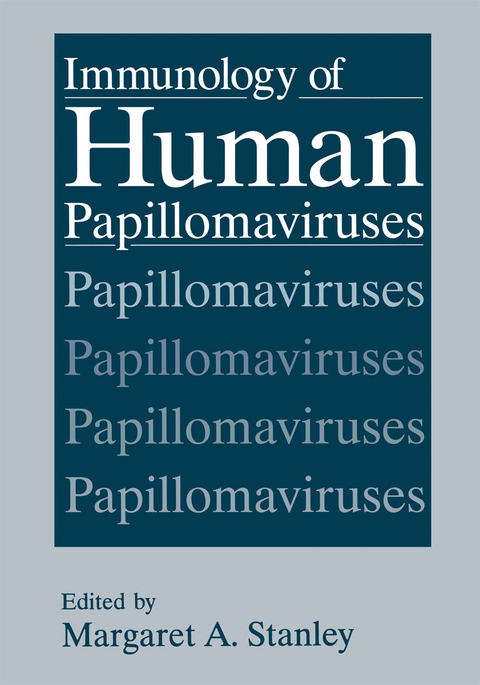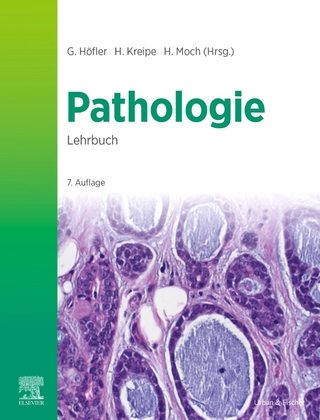
Immunology of Human Papillomaviruses
Springer-Verlag New York Inc.
978-1-4613-6041-4 (ISBN)
HPV Gene Expression.- The Antibody Response Against p53 in Cancer Patients.- Enhanced Production of Wild-Type p53 Inhibits Growth and Differentiation of Normal Foreskin Epithelial Cells but Not Cell Lines Containing Human Papillomavirus DNA.- Detection of Human Papillomavirus, Epstein Barr Virus and Elevated or Mutant p53 Expression in Squamous Cell Carcinoma of the Head and Neck.- Elevated Levels of the p53 Tumour Suppressor Gene in the Basal Layer of Recurrent Laryngeal Papillomas.- Expression of the E6 and E7 Genes of Human Papillomaviruses in Tumours of Different Dignity.- Detection of HPV-16 E2 Protein in Cervical Keratinocytes.- Evaluation of the Hybrid Capture Assay for Determination of Human Papilloma Virus.- Utilization of a PCR-based, Multiple Restriction Endonuclease Digest Technique for Enhanced Detection and Typing of HPV from Clinical Samples.- A Gene Cassette for High Level Expression of the LI Capsid Protein of HPV-16 in Heterologous Cells.- Genotyping of Human Papillomavirus (HPV) by Single-Strand Conformational Polymorphism (SSCP).- Human Papillomavirus Infection in Women with Cervical Cancer but without Cytological Abnormalities in the Preceding Years.- HPV Infection and Carcinomas of the Larynx.- Perinatal Transmission and Persistence of the Cancer Associated Human Papillomaviruses.- HP-DNA on Colpocytological Smears from HIV Positive Females.- Humoral Responses to HPV.- Humoral Immune Response to Genital Human Papillomavirus Infections.- HPV 16 Antibodies in Cervical Cancer Patients and Healthy Control Women.- Prevalence of Antibodies Against Defined HPV Epitopes Among Incident Cases of Cervical Neoplasia: Current Status and Concepts.- Serological Response to HPV 16 Infection.- Detection of Antibodies to L1, L2, and E4 Gene Products of Human Papillomavirus Types 6, 11, and 16 among HPV Infected Patients and Controls.- IgG Antibodies to Human Papillomavirus Type 16 and Serum Retinol May Jointly Protect against Cervical Neoplasia.- Prognostic Significance of Antibodies to HPV-16 E7/E4 Proteins and Fragments of Cytokeratin 19 in Invasive Cervical Carcinoma.- Development of Serological Assays for Detection of Anti-HPV-16 E6 and E7 Antibodies.- Detection by ELISA Test of Antibodies to Human Papillomavirus (HPV) Type 16 E7 in Patients with Benign or Malignant Papillomas from Skin or Mucosa.- Seroreactivity to a L2-derived Synthetic Peptide Correlates with the Number of Surgery-Necessitating Recurrences in Patients with Laryngeal papillomatosis.- Comparison of pVConformational Epitopes Expressed by L1 Proteins in Mammalian (COS) and Insect (Sf9)Cells.- Detection of Class-Specific Antibodies to Baculovirus-Derived Human Papillomarvirus Type 16 (HPV-16) Capsid Proteins.- Cell Mediated Immunity to HPV.- Evolution of Class I HLA antigen Presenting Molecules.- Major Histocompatibility Complex (MHC) Expression and Antigen Presentation in Cervical Cancer.- Analysis of MHC Class I Expression in HPV 16 Positive Cervical Carcinomas, in Relation to c-myc Overexpression.- Immunogenetic Study of Women with HPV Related Cancer of the Uterine Cervix.- Recurrent Respiratory Papillomatosis (RRP): Enriched HLA DQw3 Phenotype and Decreased Class I MHC Expression.- HPV 16-Derived Synthetic Peptides with Ability to Upregulate MHC Class I Expression on RMA-S or T2 Cells as Detected by Enzyme Immunoassay.- Regulation of MHC Class I., Class II and ICAM-1 Expression by Cytokines and Retinoids in HPV-Harboring Keratinocyte Lines.- Murine Cytotoxic T Cell Responses to Human Papillomavirus E7 Protein.- Immune Response to Human Papillomavirus Type 16E6 Oncoprotein.- Human Cytotoxic T Cell Epitopes in HPV 11: Relationships Between Allele-Specific Motifs, HLA Binding and Stimulation In Vitro.- An Imunodominant Region in HPV16.L1 Identified by T Cell Responses in Patients with Cervical Dysplasias.- Immunological Aspects of Cervical Carcinoma.- Analysis of Tumour-Infiltrating Lymphocytes in Cervical Carcinoma.- Lymphocyt-Mediated Natural Cytotoxicity to HPV 16 Infected Cervical Keratinocytes.- Animal Models and Therapeutic Strategies.- Skin Test Reactivity to Papilloma Cells is Long Lasting in Domestic Rabbits after Regression of Cottontail Rabbit Papillomavirus Induced Papillomas.- Modulation of the DTH Response to HPV 16 E7.- Fine Characterization of the HPV16 E7 49-57 Tumor Protective Cytotoxic T Cell Epitope “RAHYNIVTF”.- Vaccination of Cattle With L2 Protein Prevents BPV-4 Infection.- Immune Responses to HPV 16 E7.- Use of Double aro Salmonella Mutants to Stably Express HPV 16 E7 Protein Epitopes Carried by HBV Core Antigen.- An Experimental Tetracycline and Vitamin A Therapy of HPV Infections of the Lower Female Genital Tract.- Retinoids and IFN-? Synergistically Decrease Tumor Cell-Induced Angiogenesis and Stimulate Lymphocyte Induced Angiogenesis.- Release of Soluble Tumor Necrosis Factor-? (TNF-?) Receptor by HPV-Associated Neoplastic Cells.- Contributors Index.
| Zusatzinfo | XI, 332 p. |
|---|---|
| Verlagsort | New York, NY |
| Sprache | englisch |
| Maße | 178 x 254 mm |
| Themenwelt | Medizin / Pharmazie ► Medizinische Fachgebiete ► Mikrobiologie / Infektologie / Reisemedizin |
| Studium ► 2. Studienabschnitt (Klinik) ► Pathologie | |
| Studium ► Querschnittsbereiche ► Infektiologie / Immunologie | |
| Naturwissenschaften ► Biologie ► Botanik | |
| Naturwissenschaften ► Biologie ► Ökologie / Naturschutz | |
| Naturwissenschaften ► Biologie ► Zoologie | |
| ISBN-10 | 1-4613-6041-2 / 1461360412 |
| ISBN-13 | 978-1-4613-6041-4 / 9781461360414 |
| Zustand | Neuware |
| Haben Sie eine Frage zum Produkt? |
aus dem Bereich


